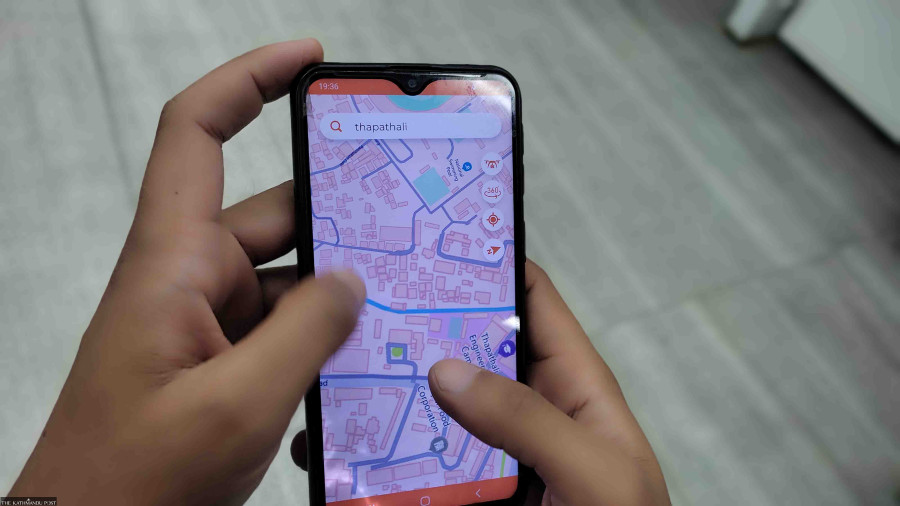Money
Nepali-made location apps gaining credence for their greater accuracy
Galli Maps, an application which helps to locate houses and landmarks and Baato app that started operations earlier this year are finding more and more users.
Pawan Pandey
When Raj Bikram Maharjan ordered an Oximeter online after his mother contracted Covid-19 in 2020, the delivery boy could not easily locate his house.
“It took him almost half an hour to track my location even though he was close to my house. I had to make frequent phone calls,” said Maharjan. “The problem was because of the poor location information.”
Maharjan, who previously worked as an aircraft maintenance engineer at Himalaya Airlines after completing a bachelor's degree in aeronautical engineering from China in 2014, thought the high-resolution maps made by using drones could provide people with better location information.
In July 2020, Maharjan along with his friends Janam Maharjan and Ashon Shakya started working on the idea.
Galli Maps, an application which helps to locate houses and landmarks, was launched in April 2022 in Kirtipur Municipality.
The application also uses house numbers assigned by the local governments.
“While the app can be useful during disaster response, it enables e-commerce businesses to actually make delivery at the doorstep,” said Maharjan.
Many countries across the globe have their own software and applications for navigation and finding locations, which, the Nepali developers say, are more precise than Google Maps.
“Google Maps, which uses satellite-based data, cannot provide information on Gallis, the alleys, such as in Indra chowk, Ason and Swayambhu,” said Maharjan, also the chief executive officer at Galli Maps.
“Google Maps cannot accurately distinguish alleys, residential and main roads,” said Prithvi Jung Khadka, business development head at Baato, another map app.
Though the Baato app started its operations in January this year, it was available as an application programming interface from 2020, for businesses.
Kathmandu Living Labs, which has been involved in open street mapping in Nepal since 2013, is the parent company of Baato.
Khadka believes that Baato can be an ideal option for individuals who find it difficult to use Google Maps due to language barrier or any other reason.
“It will be more useful for Nepalis as most of us are habituated to using directions using landmarks, instead of names of the roads,” said Khadka. “The feature is being further developed.”
Besides being an option for the Nepali language speakers, Baato also offers an offline navigation feature.
Recently, it introduced a new feature where the users are notified of the dish they liked earlier, when they are near a restaurant that serves it.
While Galli Maps allows users to search for the nearby parking spaces, hospitals, hotels, restaurants, public toilets and ATMs, Baato has an additional feature for searching for pharmacies.
According to Maharjan, besides Worldlink Communications, UNESCO has used Galli Maps in some of its projects. “Go Taxi, an upcoming taxi app, will also use our service.”
Galli Maps won the ICT Award in the Product category in December last year.
Maharjan, however, says the startup ecosystem in Nepal is not too encouraging in comparison to a neighbouring country like India.
“Many programmes are organised for startup and entrepreneurship promotion in Nepal, but the same entrepreneurs participate in almost all the programmes,” said Maharjan.
The lack of clear regulation regarding investments and the burden of tax, demoralise entrepreneurs.
“The existing government policies treat us startups like an established business when they are even struggling to gain a foothold,” said Maharjan. “The regulations of the Office of the Company Registrar are only appropriate for setting up a factory, not for startups.”
“The founder of a startup has to pay capital gains tax for the amount raised from investors for investment,” Maharjan said.
Khadka, from Baato, said working with the government is a slow process, adding that the quality of technology is as important as the state’s policies.
Many countries have started giving priority to local companies for maintaining location data in view of the potential national security risks in allowing foreign companies to have access to such information.
“Though we have not lobbied for such a policy yet, it might be helpful to us, if the Nepal government decides to do so in the coming days,” Khadka added.




 20.12°C Kathmandu
20.12°C Kathmandu














